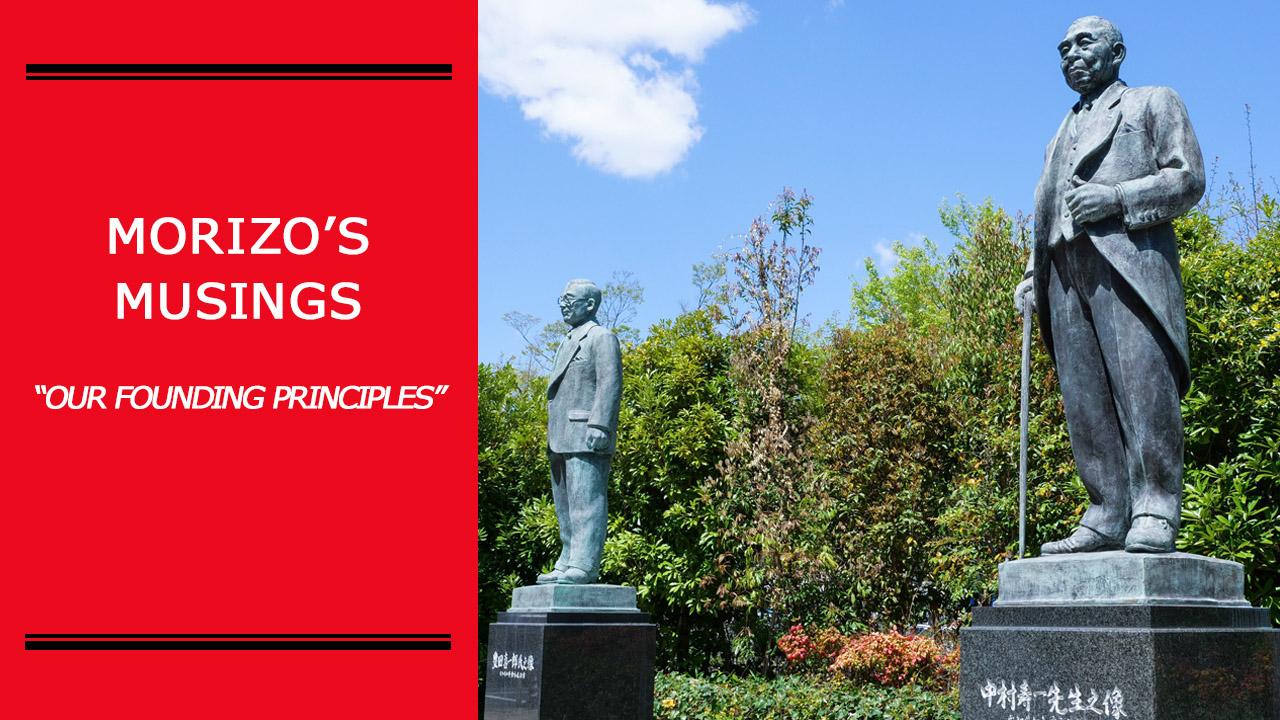
In the season signifying a new start, Morizo shares thoughts he had about Toyota's roots and founding principles.

Morizo here – hello again!
As holds true during this time of year, we had the opportunity to welcome new employees via an entrance ceremony.
In this the season where people are starting things with an eye to the future, we are taking this opportunity to reflect on our “roots” and “founding principles.”
Contemplating about where we came from also propels us to consider where we should go from here.
On that note, please let me re-visit an event that happened recently.
Exactly one month before the entrance ceremony, on March 2, a kensho-kai, or a ceremony to honor the achievements of a person, was held, in this case it was for Kiichiro Toyoda, the founder of Toyota, and for Mr. Juichi Nakamura, the mayor of Koromo City (currently Toyota City), at Toyota City Hall.
They lived in an era when Japanese people said that it was impossible to make cars.
As Japan was expanding, it became necessary for the country to have its own domestic automobile manufacturing done by its own people, which would then help the country develop and enrich the lives of its citizens. So there was interest in starting the automotive industry in Japan. Despite being called “reckless”, Kiichiro Toyoda was ambitious and leapt into the “unknown world” of cars.
However, Kiichiro was not alone.
"It’s not that people can’t do it, only that they won’t do it."
"If someone has to do it, I will become that 'someone'."
I’ve had friends and colleagues that have also thought the same way.
One such friend was the Mayor of Koromo City at the time, Mr. Juichi Nakamura.
About 80 years ago, the sericulture industry that supported the town of Koromo City, the predecessor of Toyota City, was on the decline, and it is said that the city was called “Yabure Koromo (“Hopeless Koromo City).”
Mr. Nakamura wanted to make Koromo City a town where people would be able to find hope through making cars, and prepared a vast area of land for the construction of a yet-to-be car factory. Without Mr. Nakamura's decision, neither Toyota nor Toyota City would exist today, I think. I attend this kensho-kai ceremony every year, but this year I reconsidered the significance of it.
Standing in front of the statues of Kiichiro and Mr. Nakamura, we are reminded that we have friends who have inherited the aspirations of these two.
I thought that this was the meaning of this ceremony.
Kensho-kai and entrance ceremony
These important events are held every March and April. I can’t help but feel these two events are connected.
This may be because Toyota is now rigorously working to transform into a mobility company from an automobile company.
This year's entrance ceremony for new hires to Toyota welcomed 1,492 new friends.
As they join Toyota with excitement in their eyes, I pray they’ll find something they want to pursue and commit their life to, and that they will continue to grow.
“If someone has to do it, I will become that ‘someone’.”
I commit to doing my best to make this a company where new employees can feel empowered to become that someone.
I was once again reminded of this spirit and renewed my commitment once again.
... By the way, Mr. Teruyuki Kagawa, the Editor-in-Chief of Toyota Times, is an actor, and made an appearance in a special historical TV series. In the TV drama series “Leaders,” which largely centers on the story of industry in Japan and Toyota, Kagawa plays the role the manager of the Bank of Japan Nagoya Branch. Historically speaking, it was because of the efforts of a friend to the cause like this banker that saved the company from bankruptcy at
the time of its founding.
Toyota Times Editor-in-Chief Teruyuki Kagawa has said:
“Toyota keeps saying it will change, but I think we’ve all heard this from companies before.
As editor-in-chief, my goal is to be candid and to speak what I want to say freely.
But personally, I think that any responsible reporter’s job is to seek the truth, to ask questions. We must have an obsession for the truth. If we can figure out what is the truth, I think we’ll see more interesting things in the future.”
Am I the only one who thinks all of these interesting things for the future might be connected to Toyota?

